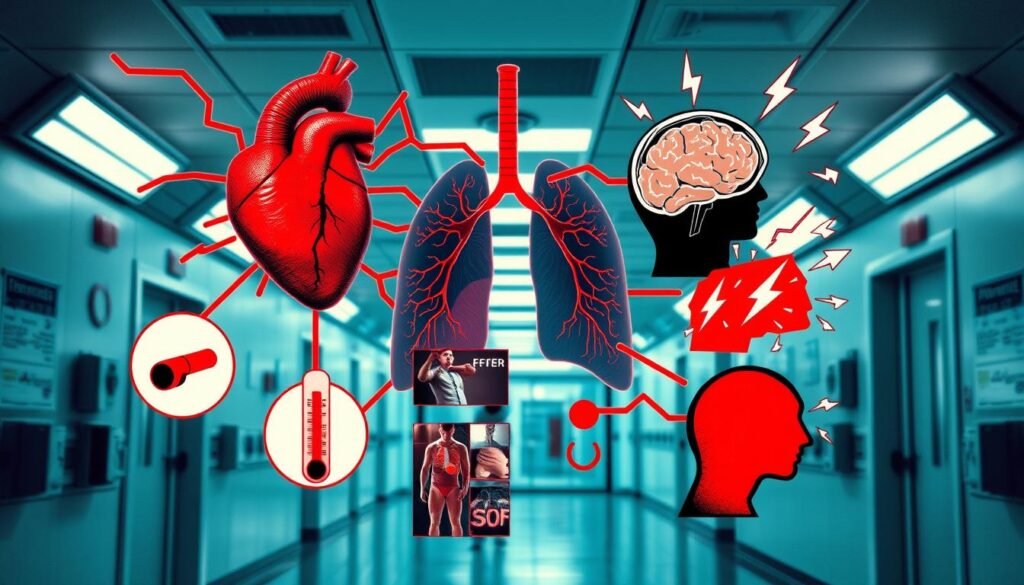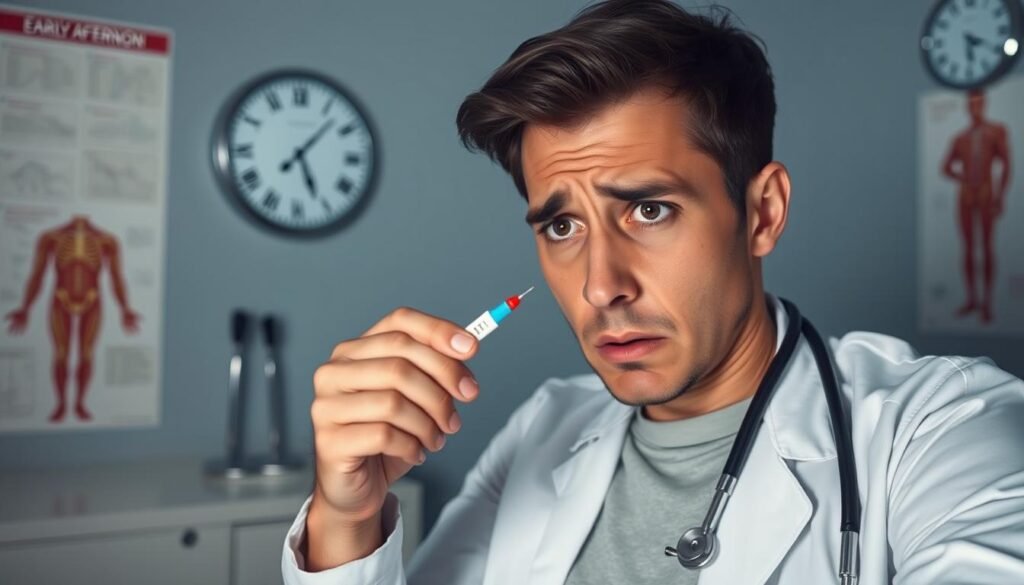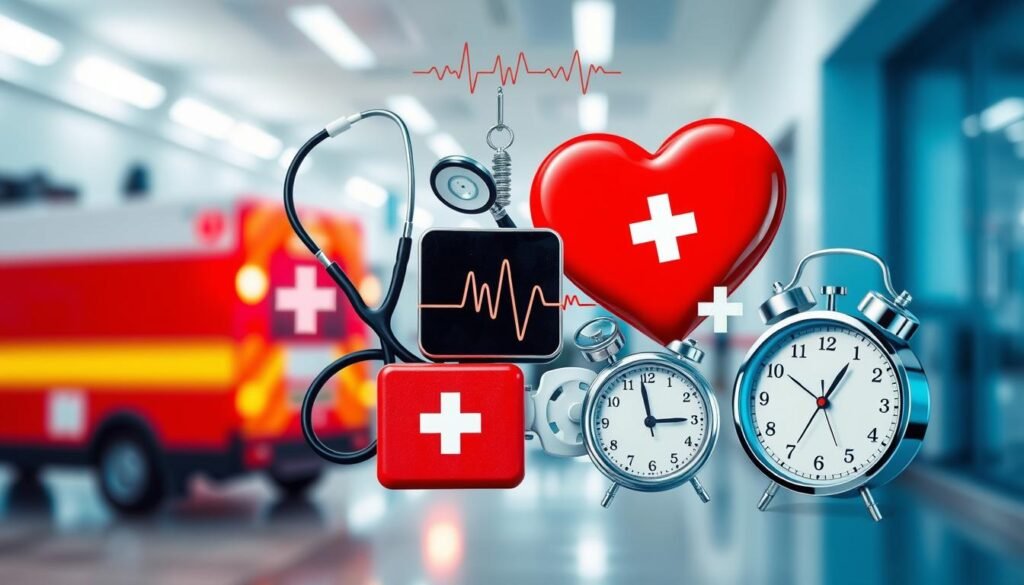In 2012, the top reason people went to the doctor was because of a cough. This fact comes from the Centers for Disease Control and Prevention (CDC). Knowing when to see a doctor is very important. It’s crucial with common symptoms around. It really matters for health and treatment when you know which symptoms need immediate attention.
Some individuals delay getting help. But, if you feel something is wrong, it’s smart to get a doctor’s advice. Trusting your gut in health matters is very important.
There are several warnings that you should not ignore. These include ongoing high fevers and losing weight without trying. It’s important to know when to go for a normal visit or when you need urgent medical care. This knowledge lets people act fast when they face dangerous health conditions or see worrying changes.
Key Takeaways
- Common reasons for doctor visits include cough and unexplained weight loss.
- A fever above 103˚F lasting longer than three days needs medical evaluation.
- Sudden changes in bowel or urination patterns should prompt a doctor’s visit.
- Recognizing mental health shifts can help seek necessary medical attention.
- Trusting your instincts about health can lead to timely medical intervention.
Understanding the Importance of Seeking Medical Attention
Knowing when to get medical help is key for good health. Getting help early can lead to better outcomes. It’s important to know when to seek urgent care, even for everyday health issues.
Preventive care means getting regular check-ups. These can find health risks before they get worse. Things like checking for signs of serious conditions early can help prevent them. Doctors might suggest changes in your lifestyle or tests.
It’s important to know when to see a doctor. Not doing so can let health problems get worse. Regular talks with your doctor promote a proactive approach. This can greatly improve your health over time.
Being on top of your health helps avoid serious illnesses. It also promotes making healthy choices. This lowers the chance of getting sick. In turn, it leads to a better life.
Common Symptoms That Require Immediate Attention
Knowing urgent symptoms can greatly help your health. If you know which symptoms need quick help, you can act fast. This can change your health outcome for the better. Here are some symptoms to watch out for:
- Persistent high fever: This could mean a few different health problems. It needs quick action to avoid serious trouble.
- Unexplained weight loss: If you’re losing weight fast without trying, it’s time to see a doctor. This could point to big health issues.
- Chest pain: Chest pain that comes suddenly and makes it hard to breathe is alarming. It could be a sign of heart issues.
Sometimes, you might need emergency help. If you have really bad stomach pain or an intense headache, it’s vital to get medical attention. Quick action can lessen the danger and help with getting the right treatment.

When to See a Doctor: Symptoms That Require Immediate Attention
It’s critical to know which symptoms mean you need to act fast. Don’t ignore things like a lasting high fever or sudden weight loss. These signs could point to serious health issues that need a doctor’s look right away.
Persistent High Fever
If you have a fever over 103°F or one that doesn’t go away after three days, get medical help immediately. Such a high fever can mean serious infections or health problems. Not acting can make things worse, so it’s important to see a doctor quickly.
Unexplained Weight Loss
Losing more than 10% of your weight in six months without trying signals big health concerns. It could mean diabetes or hyperthyroidism, especially with symptoms like nausea. Seeing a doctor early for unexplained weight loss is key for proper diagnosis and treatment.

Knowing when to seek medical help is super important. Understanding the seriousness of symptoms like high fever and sudden weight loss guides you to the right path of care. For more on when to get help, click here.
Recognizing Life-Threatening Conditions
Knowing the signs of serious health problems is very important. If you feel chest pain and find it hard to breathe, it could mean a big heart issue. Pain in your belly or lower body may be a sign of something like appendicitis. Spotting these signs early can help save lives by getting help fast.
Chest Pain and Shortness of Breath
If your chest hurts for more than two minutes and you’re struggling to breathe, get help right away. The American College of Emergency Physicians says these signs could mean a heart attack. Knowing this can save your life, so quick action is key.
Severe Abdominal or Pelvic Pain
Never ignore bad pain in your belly or pelvic area. It could be caused by serious problems, like appendicitis. Seeing a doctor quickly can mean getting the right treatment soon. This helps avoid worse problems from waiting too long.
Signs of Urgent Healthcare Needs
It’s key to know when health issues need quick care. Changes in how your body works or how you feel can be clues. They may show that you need help right away.
Changes in Bowel or Urination Patterns
Sudden changes in how often you go to the bathroom are worrying. They should be checked out fast. These signs could be:
- Blood in stool or urine, signaling serious issues like bowel disorders or infections.
- Lasting constipation or diarrhea, hinting at problems with digestion.
- Problems with peeing, which might mean urinary issues.
Staying aware of these shifts is crucial. They can point to urgent health concerns that might worsen without quick doctor’s advice.
Sudden Confusion or Mood Changes
Sudden confusion or big changes in feelings need a doctor’s look. Keep an eye out for:
- Quick start of confusion, possibly hinting at brain issues or infections.
- Hard-to-explain mood swings, which could suggest deep health problems.
Getting help fast can make finding out the problem and treating it easier. Addressing these signs early can boost health outcomes.

Understanding Medical Emergencies
Medical emergencies can happen without warning. Quick action is needed for the best outcomes. Knowing the signs of a stroke and severe allergic reactions can save a life. Being informed helps you make quick decisions about health care.
Recognizing Warning Signs of Stroke
Strokes are very serious and need fast action. Knowing stroke signs is critical. These include sudden weakness on one side, trouble speaking, or losing coordination. Quick help can greatly improve recovery chances. Plus, making good lifestyle choices can prevent 80% of strokes.
Identifying Severe Allergic Reactions
Severe allergic reactions can get worse quickly. They can even be deadly. Watch for signs like trouble breathing, face or throat swelling, or hives. Knowing these can save someone’s life. If you see these signs, use an epinephrine auto-injector and call for medical help right away.
| Condition | Warning Signs | Immediate Action |
|---|---|---|
| Stroke | Sudden weakness, difficulty speaking, loss of balance | Call 911 immediately |
| Severe Allergic Reaction | Difficulty breathing, swelling, hives | Administer epinephrine and seek emergency help |
How to Respond to Danger Symptoms
When you notice danger symptoms, act fast to stay safe. Keep calm and figure out how serious the situation is. Knowing what to do next is key for your well-being.
What to Do Before Getting Help
Dealing with danger symptoms the right way is crucial. If it’s safe, you should:
- Stay seated or lie down to prevent falling.
- Seek assistance from those nearby if possible.
- Prepare for emergency services by noting down symptoms and any necessary medical history.
- Remain calm to help clearly communicate issues to responders.
When to Call 911
If symptoms are severe or life-threatening, call 911 without delay. Waiting to get help can lead to serious outcomes. This is especially true for heart attacks or strokes.
Ignoring symptoms like bleeding in your stool or severe pain can be dangerous. Sudden confusion also needs quick medical help.
To make good decisions, know the symptoms of urgent conditions. Learn the signs of strokes and heart attacks. For more info, visit this resource.
Accessing the Right Level of Care
Understanding healthcare options is crucial, especially for urgent care needs. Emergency rooms (ER) and urgent care centers address different medical situations. ERs handle life-threatening conditions, such as heart attacks, around the clock. Urgent care centers focus on less serious issues needing quick care. Knowing the difference is key to getting the right treatment.
Emergency Room vs. Urgent Care
Choosing between an emergency room and urgent care depends on symptom severity. ERs are for urgent, life-threatening issues. These include serious injuries, difficulty breathing, and major trauma. Urgent cares handle less severe problems like sprains, minor infections, and small cuts. Scripps HealthExpress provides walk-in services, ideal for non-emergency situations outside regular hours.
What Symptoms Require Emergency Medical Care
Knowing which symptoms need emergency care can save lives. Go to the ER for severe chest pain, trouble breathing, intense dizziness, or big fractures. For less serious conditions like coughs, earaches, or minor burns, urgent care is more appropriate. This knowledge helps people choose wisely, ensuring they get suitable care quickly.